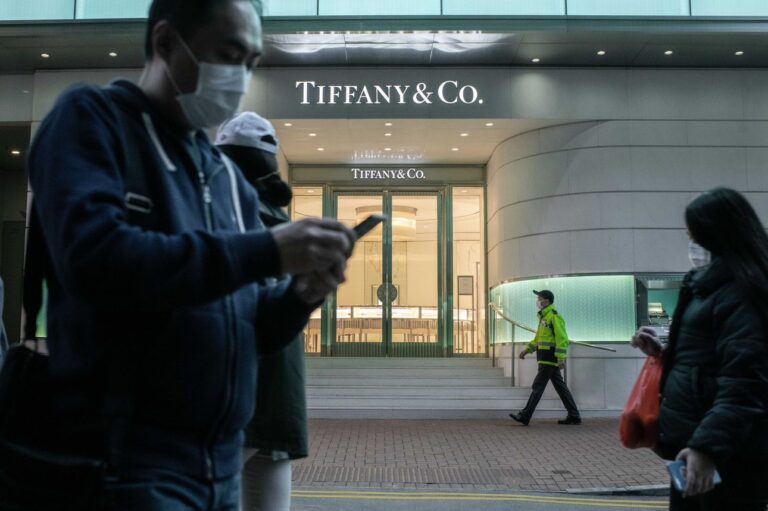
People wearing face masks outside a Tiffany & Co. luxury store in Hong Kong.
PHOTO: IVAN ABREU/BLOOMBERG NEWSAutos and luxury goods are among the sectors in Europe that are likely to be worst hit as the coronavirus spreads and damages the Chinese economy and consumption, while services could also suffer badly, analysts say.
The European Union is China’s largest trading partner and a total of 10.7% of European exports go to China, according to the Eurostat’s latest data.
U.K. luxury-goods firm Burberry (BRBY.L) already warned on Friday that its sales in mainland China and Hong Kong will be hit by the coronavirus outbreak. 24 of its 64 stores in mainland China are closed, with the remaining operating with reduced hours and experiencing significant footfall declines.
Swiss bank UBS said the rapid spread of the coronavirus heightens the risk for luxury-goods stocks in the near-term, due to the sector’s high exposure to tourism–which accounts for 43% of the market–and especially the Chinese consumer, who represents 33% of the total market.
French luxury cosmetics and personal-care product company L’Oreal SA (OR.FR) said the coronavirus outbreak would hit its China and Travel Retail Asia business, although it is too early to assess the extent of the impact. For now, it remains confident in the prospects for 2020.
With the auto sector, not only consumption, but also production is on halt due to China’s coronavirus outbreak.
“The epidemic simply adds to our negative view of autos and we have taken out defensive positions in certain companies, while remaining positive on more robust firms which we think should be able to weather the storm,” says Ilana Elbim, senior credit analyst at Federated Hermes.
One other sector that could be badly hit is services.
“Restaurants, shops and movie theaters are badly affected,” says Sebastien Galy, senior macro strategist at Nordea Asset Management.
The experience of the SARS in 2003 shows that the service and retail sectors are the most vulnerable to outbreaks of epidemics, said Aidan Yao, China senior economist for AXA Investment Managers.
The potential hit to services could be even worse because purchases of goods in some cases might be postponed, but with services, purchases are simply lost.
“The key question is how much of [the] disruptions of the first quarter are a final loss and how much will be recovered at a later stage,” said Reinhard Cluse, Europe chief economist for UBS.
“This virus means that supply do not move as much, inventories are wound down and that consumers stock up and then delay future consumption,” says Mr. Galy.
While durable-goods purchases are likely just postponed, the losses in services are usually final.
The tourism sector will suffer from the travel restrictions imposed by the government curtailing tourist inflows from China. Goldman Sachs expects declines in travel services of 50% in the first quarter in the eurozone.
The investment bank said the main growth impact in Europe is likely to come via reduced exports to China, as exports to China are about 1.4% of GDP for the eurozone.
“The hit to global trade means that the open euro area economy is likely to feel the direct impact, with countries like the Netherlands particularly at risk given its importance as global trade hub,” Oxford Economics Angel Talavera said.
UBS’s Cluse said levels of Chinese imports are key for European companies and that these may not be as hard hit as some fear.
“If Chinese imports don’t react much, European exports won’t suffer much either,” Cluse said.
The impact of the coronavirus in the eurozone will depend on how prolonged the virus outbreak is and the extent to which it harms consumer confidence in the EU, said Timme Spakman, international trade economist at ING.
“If the virus and the containment measures are over quickly, a rebound is to be expected. However a prolonged period of shutdowns in China may induce more structural damage that spills over to the EU,” he said.
Mr. Spakman doesn’t rule out the virus spreading to Europe or the U.S. If this were the case, the main channel of contagion of the virus to the economy would be through “fear,” which could take its toll on consumer-spending growth among developed economies.
“Fear of catching the virus results in a change in household behavior that is arguably disproportionate to the chances of either catching the disease, or of dying from it,” ING said.
Write to Maria Martinez at maria.martinez@wsj.com
